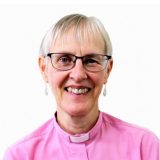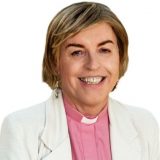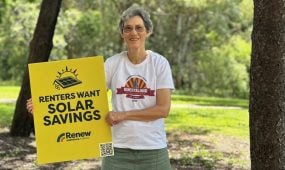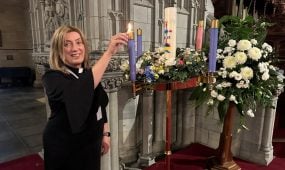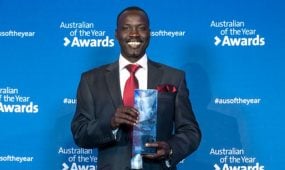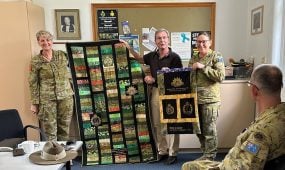Q&A with priests, academics and spouses, The Rev’d Penny Jones and The Rev’d Dr Jo Inkpin
Spotlight Q&A
Meet Penny Jones and Jo Inkpin and find out about their ministry, what projects they are currently working on, what books they give away the most and why, what people of faith inspire them, their best childhood memories, and how their respective faiths inspire and shape them
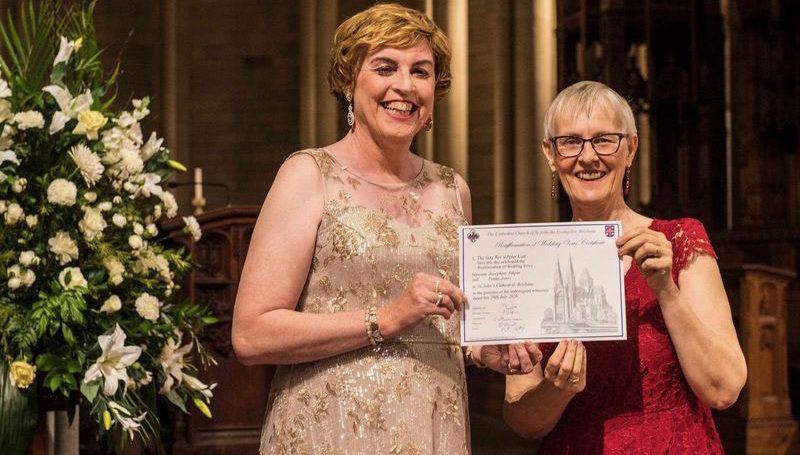
The Rev’d Penny Jones and The Rev’d Dr Jo Inkpin met in the early 1980s while studying in the UK and have been married for 35 years. They minister alongside each other at St Francis College and The Parish of Auchenflower-Milton and are parents to twin daughters and grandparents to three children.
Where and when did you meet?
Penny and Jo: We met as theological college students in England in 1983. It wasn’t exactly love at first sight, but we were increasingly drawn together by growing delight in one another and shared passions. Despite some external challenges, we have been hugely blessed in our marriage, and celebrated this July by reaffirming our vows at St John’s Cathedral on our 35th wedding anniversary.
Where do you worship?
Penny and Jo: We rejoice to share in the loving, diverse and creative Milton Anglican community and in the many-faceted life of St Francis College, Brisbane.
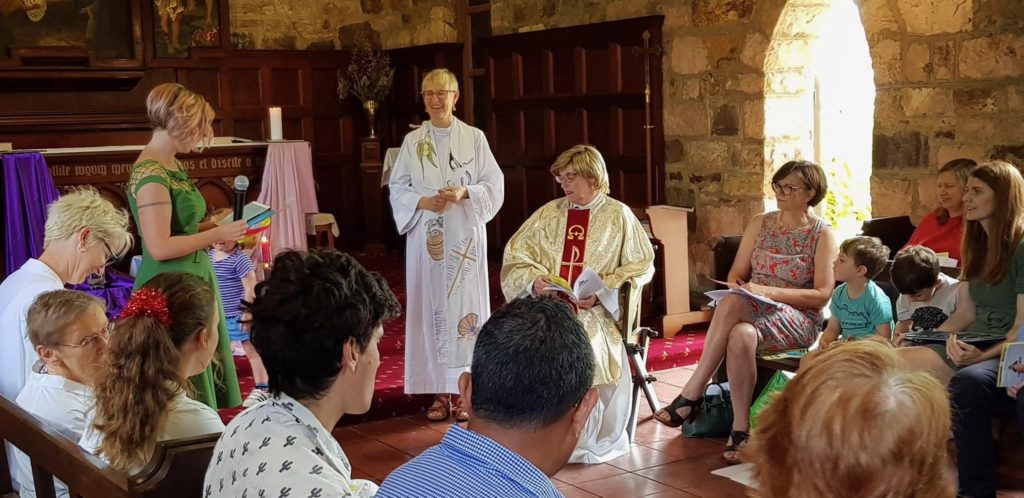
Celebrating Christmas in 2018 with fellow worshippers from the Milton Anglican community in the Chapel of the Holy Spirit at St Francis College
How long have you been involved in the Anglican Church and in what roles?
Penny: I was baptised at university and became a lay religious in 1980, then a deaconess in 1986, deacon 1987 and priest in 1994, as those roles became open to women. I have worked as a parish priest, theological educator, honorary canon, spiritual director and supervisor.
Jo: I am a cradle Anglican – baptised, confirmed, married, and ordained (as deacon in 1986 and priest in 1987) within the Church of England. I have worked as a parish priest, theology lecturer, rural and environment officer, ministry/mission development adviser, and been a member of Diocesan Council and General Synod.
Advertisement
What are your current roles, including any voluntary roles, and what do your roles involve?
Penny: I occupy two part-time roles as priest-in-charge of The Parish of Auchenflower-Milton and Director of Formation at St Francis College. I see both roles as supervisory and about enabling the people of God to fulfil their vocations.
Jo: I am a Lecturer in Theology (chiefly church history) and Senior Tutor at St Francis College, and also co-chair of the Anglican Church Southern Queensland (ACSQ) Reconciliation Action Plan Working Group and coordinator of the Rainbow Faith project (a chaplaincy initiative within the ACSQ). My work focuses on educating and resourcing greater encounter with the ‘Larger Christ’ of Christian tradition and contemporary diversity.
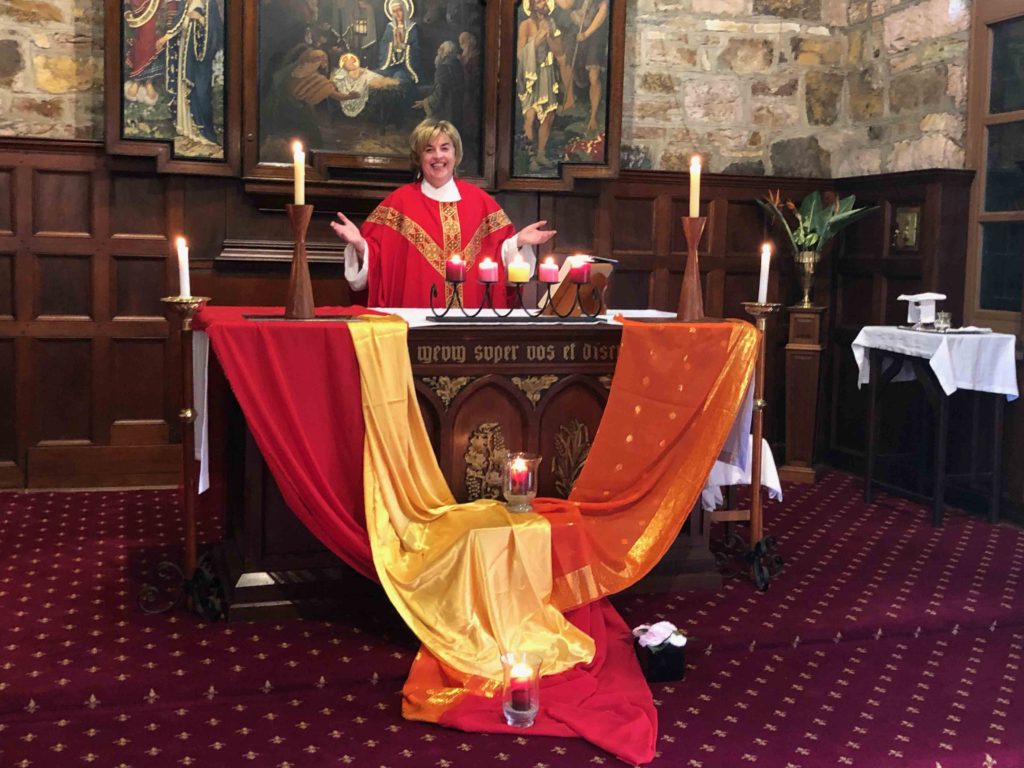
Jo, preaching and presiding for Pentecost at the Eucharist in the St Francis College chapel
What projects and activities are you currently working on?
Penny: In the parish, projects focus around our calling to an audacious living out of the Gospel, through initiatives that invite connection and creativity, grounded in practices of contemplation. In the college my focus is on training that equips collaborative and imaginative leaders, with deep spirituality and a heart for justice.
Jo: Helping develop the new ACSQ Reconciliation Action Plan to deepen Church commitment to justice with First Nations peoples and renew our shared faith through the spiritualities of the land and seas. Through the Rainbow Faith project and Equal Voices, Anglican women’s networks and the State Library’s ‘Dangerous Women’ project, I am also assisting our churches to become places that fully affirm the God-given gifts of everyone.
Advertisement
What have been the highlights of your roles so far?
Penny: After 35 years there are so many wonderful memories, but in our Diocese perhaps the opening of the Toowoomba City labyrinth, which involved engagement from community and inter-faith groups in celebrating the creation of a spiritual resource for the city for generations to come. Leading retreat or pilgrimage is always a highlight of my ministry, also, as it enables me to bring together my various skills and callings in a place of close encounter with God.
Jo: Like honouring our personal memories, attending well to our shared histories is essential for healthy Christian identity and moving into greater maturity and freedom. I am therefore always particularly delighted when students and other Church members grasp something of the treasures of our past and their transforming potential.
What have been the key challenges of your roles so far and how have you worked through these?
Penny: For the first two decades and even now the lack of celebration of female ministry and leadership. Like every such challenge this demands prayer, resilience, courage, audacity and compassion – gifts for which I have struggled with the help of wise counsel and good friends both within and beyond the Church.
Jo: When I was a curate, my rector once helpfully described the Anglican Church as a generally likeable and well-meaning elderly relative who is somewhat deaf and slow to grasp the spirit and fresh joys of their emerging wider family and changing world. Determination, compassion and creative communication are therefore needed to help enable the whole family to grow.
What are your plans and goals for the next 12 months?
Penny: To remain flexible and open in the face of constant change and unpredictability.
Jo: COVID-19 has challenged us to be open to God’s prompting here and now, rather than our own human plans. I hope to focus more on those things which really matter, including healthy relationships and nurturing a climate of loving kindness.
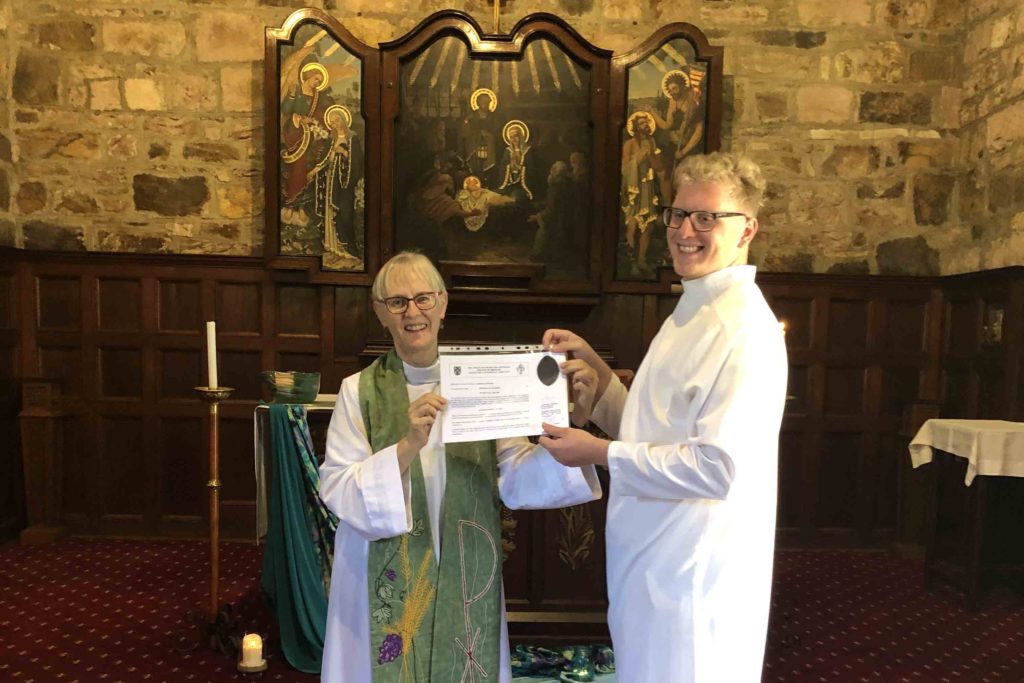
Penny presenting a Liturgical Assistant licence to Tom Hammer in the Chapel of the Holy Spirit in September 2019
Can you tell us a little about your personal faith journeys?
Penny: I always had a sense of God and prayed even though my family rejected the Church as a ‘bunch of hypocrites’. At university I encountered Anglican music and liturgy, the poetry of John Donne, TS Eliot and RS Thomas and undertook my first retreat, which along with pilgrimages to Taize led me to contemplative prayer. Silence and stillness, alongside meditative movement, remain the bedrock of my faith journey.
Jo: Maude Royden (the great Anglican peace and justice campaigner, and pioneer of female ministry) used to call faith ‘the great adventure’. Like her, I’ve been enriched in this by wonderful strands of the ecumenical kaleidoscope; living movements for truth, peace and justice; and, not least, the grace and fruits of God that come from deep wrestling with authentic identity, and striving for a better world.
How does your faith inspire you and shape your outlook, life choices and character?
Penny: My faith constantly challenges me to see the other as Christ sees them and to soften my heart, not least towards myself.
Jo: As a transgender person I’ve had to wrestle deeply with the ambivalent nature of much received Christian faith. In doing so, I’ve been enriched by the God of infinite love who can transform our own fears and the powers over us, bringing me greater empathy with the struggles of others and a deeper commitment to truth and justice for all.
What is your favourite scripture and why?
Penny: For a long time’, I would have said Galatians 3.28, but in recent times I find great encouragement in Psalm 139.12, translated in the hymn as “for dark and light are both alike to thee”. This reflects both my experience of prayer and my understanding that all binaries are false human constructs ultimately subsumed in the goodness and love of God.
Jo: The Sermon on the Mount, not least the Beatitudes as descriptions of where God is present among us. It embodies Jesus’ understanding of faith as a Way, not a system – flexible, transformative, nonviolent, affirming of the marginalised, and centred on love where ever it may be found.
What person of faith inspires you the most and why?
Penny: Hildegard of Bingen, 12th century Benedictine abbess, writer, composer, artist, herbalist, dancer, mystic, and adviser of leaders both secular and ecclesiastical. I admire the diversity of her gifts, her tenacity of purpose and her skill as a spiritual advisor and mentor.
Jo: Josephine Butler (née Grey), my namesake and fellow daughter of England’s north east. An Anglican saint and proto-liberation theologian, she endured both intense personal suffering and the cost of empowering others, taking on Victorian sexual double standards and opening the way for women’s advancement in many fields.
What are the primary strengths of the Church and what is the best way to make the most of these for the benefit of our communities?
Penny: Its capacity for constant reformation through the action of the Spirit. God’s mission is to transform the created order and the Church can be useful for that in so far as it remains open to the coaxing of the Spirit.
Jo: The grace of God in the life and teaching of Jesus is the Church’s true strength, where it is shown in the lives of people of loving transformation. When we focus on engaging with Jesus and his Way of being, things happen!
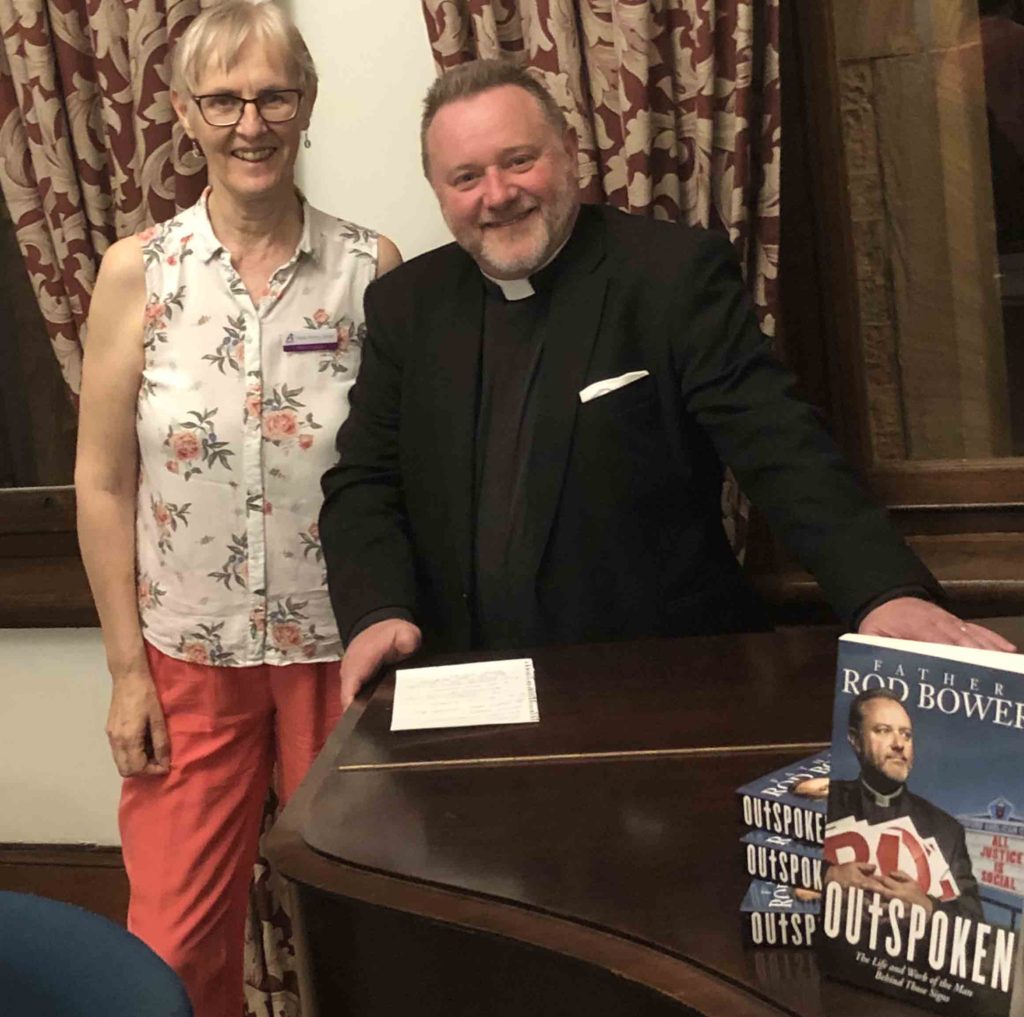
Penny with Fr Rod Bower at ‘Christians in the public space’ community engagement event in Old Bishopsbourne in September 2019
What are the primary challenges currently encountered by the Church and what is the best way to overcome these for the benefit of our communities?
Penny: The perception that the Church is not merely irrelevant but sometimes harmful to spiritual growth and healthy community. This can only be tackled by being willing to let go of our sense of entitlement and listen to others.
Jo: The Church has a significant moral and intellectual credibility gap, due partly to continuing obscurantist teachings and self-obsessions, and partly to its now well exposed child abuse, and continued resistance to full affirmation of others. Renewed respect, only achievable over time, is best earned by honesty, humility to the gifts and insights of others, and focusing on the Spirit of God in all Creation not simply the life of the Church itself.
What is the kindest gesture you have ever received or witnessed?
Penny: When I was in hospital and went into shock, the gestures of the emergency ward nurses in providing warm blankets and tender care were incredibly kind and I am often amazed by the generosity and kindness of healthcare professionals in general.
Jo: The kindest people I’ve ever met endure extraordinary poverty, exploitation, and violence in the Philippines. In particular, I’ll never forget the incredible generous hospitality of one aged widowed grandmother who gave me shelter and meals in the broken-down, flood-stained hovel in which she cared for her family, many of who live with disability, whilst daily traveling and working for long hours in Manila to provide for basic necessities.
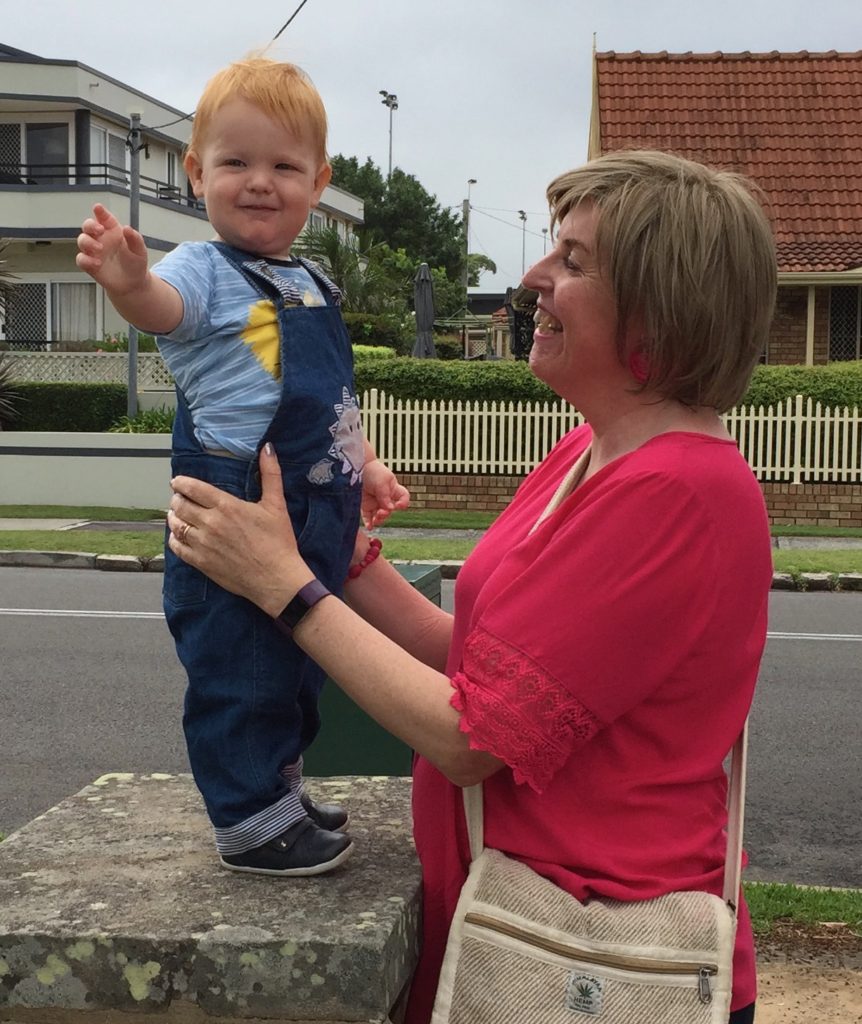
Jo enjoying a special moment with one of her cherished grandchildren
What is the best piece of advice you have ever received and who gave you this advice?
Penny: Ï cannot remember exactly who advised me in this way, but I have found helpful the advice that ‘it is easier to be forgiven than be given permission’. There are times when swift action, especially in pastoral contexts, is required. In these circumstances I will follow my instinct and seek forgiveness afterwards if necessary.
Jo: An old priest in one of England’s most remote parishes gave me several pithy practical pieces of advice, including ‘when you’re visiting somewhere you don’t know, always take care where you sit down, and park your car where you can see it and in the direction for a fast get away.’ As a result, I’ve escaped from some very dodgy rural and inner-city situations and, from time to time, still avoid violence in meetings with difficult counselees and others.
What do you do in your free time to recharge and relax?
Penny: Dance, yoga, tai chi or any moving meditation practice that refreshes and I enjoy the practices associated with interplay. Walking our border collie Brigid is vital to my wellbeing and being beside the sea is always my favourite place to be.
Jo: My rejuvenating passions include walking and sport, especially running, and ‘the beautiful game’ of (association) football.
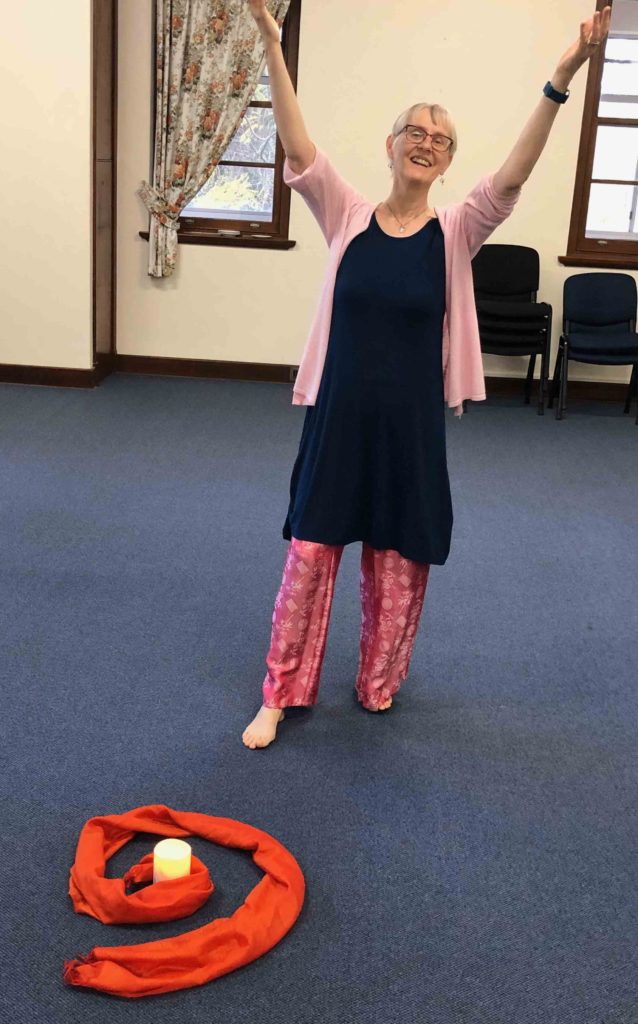
Penny leading a sacred dance workshop at Mercy Place, Bardon in 2019
What book have you given away most as a gift and why?
Penny: All Desires Known by Janet Morley, former director of Christian Aid. This book of feminist prayers was a lifeline during the struggle for women’s ordination and remains a deep wellspring of prayer for all who strive for inclusivity and justice.
Jo: To Bless the Space Between Us, as in it the wondrous Irish poet-priest John O’Donohue draws on Celtic spirituality to weave inspirational words for many contemporary dilemmas and times of change, exploring ‘blessing’ as a way of life through which the whole world is transformed.
Related Story
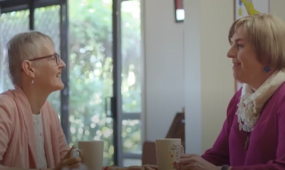 News
News
Cathedral proudly welcomes the ABC and Jo Inkpin
What’s your best childhood memory?
Penny: Dancing – ballet classes from the age of two and countless Eisteddfods for the sheer joy of movement and the community that dancers experience in their bodies.
Jo: Visiting my maternal grandmother’s house as a child, and dressing up with her marvellous box of dresses, scarves, brooches, earrings, hats and high-heeled shoes.
If you are having a bad day, what do you do to cheer yourself up?
Penny: Eat chocolate, walk the dog, play the piano (badly) and find something to sing.
Jo: Play music, especially songs of affirmation, lamentation, joy and hope in struggle.
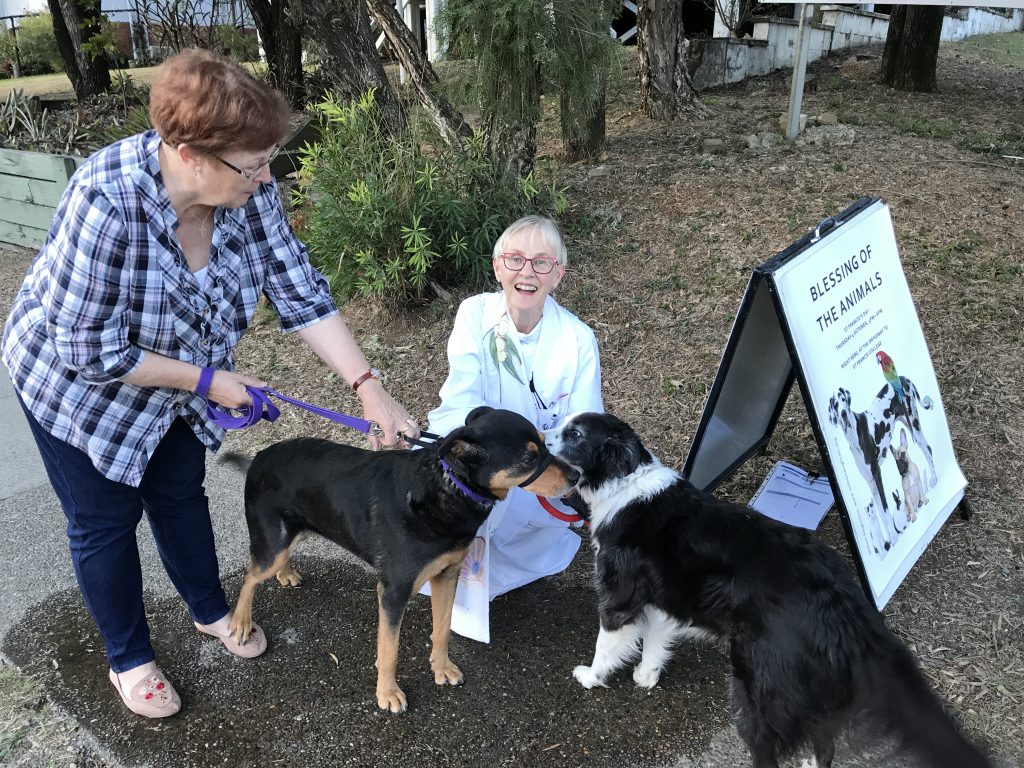
The Rev’d Penny Jones, Director of Formation at St Francis College, blesses Brigid and Roxy, pictured here with pet owner Sue Barker, on 4 October 2019 on St Francis’ Day
What day would you like to re-live and why?
Penny: Taking as read my wedding day and the day our twin daughters were born, the day of my ordination as priest and the celebratory party afterwards in Gateshead, at which so many different people sang and played from different parts of the inter-faith community and the wider secular community.
Jo: I’d actually like to be a female version of Bill Nighy and his son in the film About Time – able to time travel and relive every moment more richly.
What is you unanswered question – the question you keep asking yourself?
Penny: Every night I follow a process of Examen that asks questions about the things for which I am most grateful and asks, ‘what would I like to do differently tomorrow?’
Jo: How long O Lord? Or, as Bob Dylan put it, how many years can some people exist, before they’re allowed to be free?
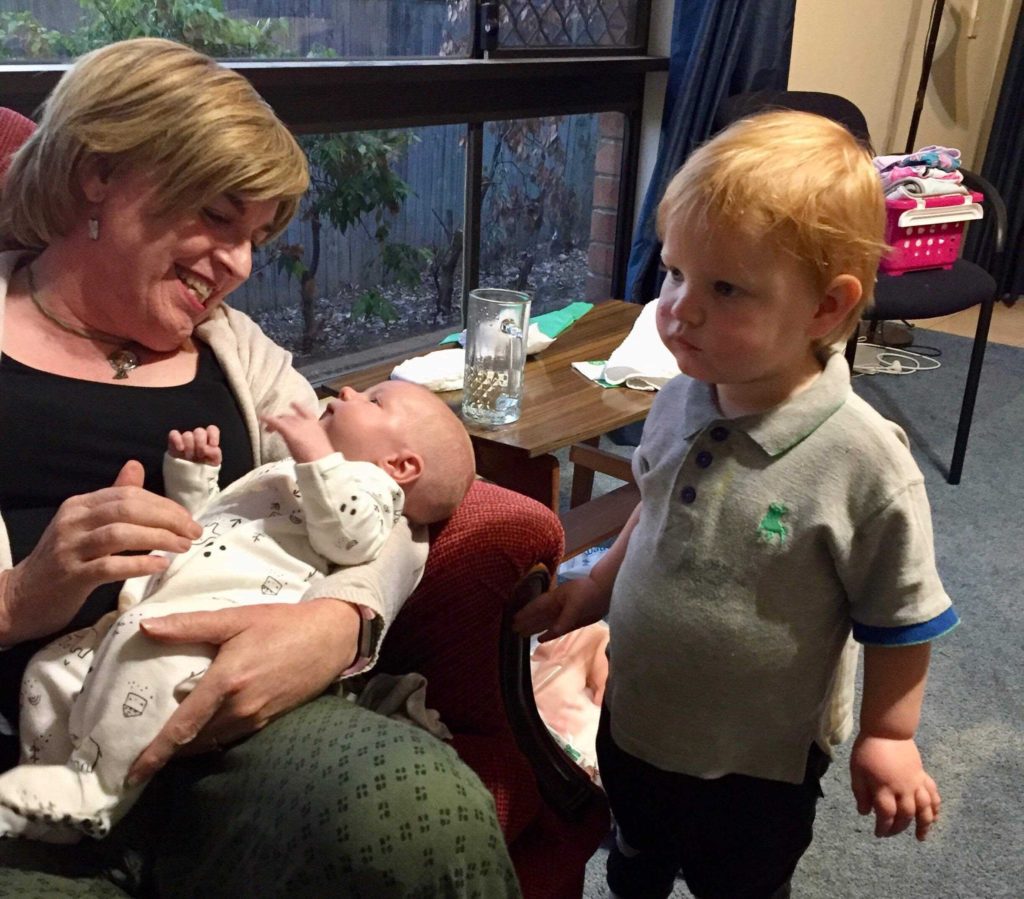
Jo at home in 2019, with two grandchildren

